- Home
- Belva Plain
Evergreen Page 19
Evergreen Read online
Page 19
“But he hardly knows you. It’s not as if you were someone in his circle.”
She didn’t answer and he did not press her. Poor Joseph! He was skirting the subject, wanting to ask more and yet afraid to. These past years had been too much for him, had beaten down some of that first strong assurance. He had been ladling out the ocean with a cup since the Depression began and he was tired. Soft pity moved Anna and she spoke lightly, wanting to soothe and ease his mind.
“What it comes down to is simply that I was a pretty little maid in that house and people are kind to pretty little maids. You’re surely not jealous?”
“Well, I could be, but since you explain it that way, I won’t be.”
“Please. Let’s not have any repetition of that business when I met them on the street that time.”
“I was awfully angry, wasn’t I?”
“You were. And without reason.”
He was silent.
“Joseph? Please. No tempers now. I just—can’t take it.”
“Why? Am I so fierce?”
“You can be.”
“I won’t be. Anna, dear, forget it. Forget the damned picture. It’s not worth talking about. Let’s go to sleep.” He sighed and, drawing her to him laid his head in the curve of her shoulder.
He sighed again. “Ah, what peace! No matter how cold and tough it is outside I have this refuge! For a few hours here at night I can forget debts and new business and the office rent. Just think of basic things, of you and me. That’s what it’s all about, Anna, the way it all began. Just you and me and the beautiful little boy and girl we’ve made together.”
She swallowed hard. There was such a lump in her throat, such a lump of pain.
“And I have to fight for all of you, my people. Ah, well, maybe with this new man, this Roosevelt coming in, things will be better. I hope so,” Joseph murmured.
When he had fallen asleep Anna turned over. Such trust, such loyalty and trust! It was an armor that he wore without knowing that he had it on. You couldn’t wound a man who wore such armor. A line of poetry trailed through her head, something Maury had memorized for his Latin class, something like “virtue defends him.” Tears trailed down her temples toward her ears. Alone I am, entirely alone. For who else can get inside my head, my heart, and feel what I feel? All my confusion, tension, terror? I stand before the great dark future and I can’t know what is waiting there for me.
It grew cold. Fear chilled. She crept toward the solid bulwark of Joseph’s back, feeling for comfort in its warmth. Then came a fleeting recall of Paul’s words: “I want to wake up and find you next to me.” A feverish wave of heat dispelled the chill; she trembled with desire, shame, fear, and then grew cold again.
The clock’s hands glimmered on the night table. With wide-open eyes Anna lay, watching the hands move steadily forward through the night.
The telephone rang at ten o’clock. It rang once only; she had been waiting beside it.
“I didn’t sleep all night, Paul,” she told him.
“Neither did I. Have you decided when and where?”
“Paul, I can’t see you now. I don’t say never, only not now.”
“I was afraid of this.”
“It’s I who am afraid. Guilty and afraid. I haven’t got the strength to cope. Please understand, and don’t be angry.”
“I don’t think I could ever be really angry at you. But I am miserably disappointed.”
“It’s so hard! So very, very hard!”
“You’re sure it’s not you who’re making it harder?”
“I don’t think so. I did try to explain to you yesterday how it is.”
“Yes, you did. And I understood. But I’m not going to let you cut the cord between us, Anna. Not ever.”
“I’m not asking you to. If you let me know where you are I’ll send you a postcard every now and then, a harmless postcard that anyone might read. Only you will know that it is about Iris and me.”
“Tell me again: I think you said a moment ago that you didn’t mean ‘never’; you only meant ‘not right now.’ Isn’t that what you said?”
“Yes, yes.”
“Then I’ll be patient. And I’ll always let you know where I am. With a postcard, too. Do you have women friends who travel?”
“Oh, yes. Pick any name. It won’t matter.”
“I’ll do that.”
“Paul? Will you hang up now?”
“In a moment. Just remember this: when you have changed your mind about meeting again or about marriage, or if you ever need me for anything, send me three or four words and I’ll come to you. And you will change your mind, you know.”
“I’m going to hang up now,” she said softly.
“All right. Hang up. But don’t say the word ‘good-by.’”
BOOK
2
RANDOM
WINDS
18
Maury was the only one of the family who made no changes; they had kept him in the school because it would help him, they believed, to get into Yale. Besides, it was more important for a boy. Joseph knew Maury would get as good an education at City College; some of the best brains in the nation had come from there. But somehow it had always been taken for granted, he didn’t remember how or why, but just as far back as he could think it had been assumed that Maury would go to Yale. It had been a kind of promise and he couldn’t diminish himself in the eyes of his family by breaking it. However much they might deny the diminution, and they would, Joseph would feel that it was.
And so the acceptance had come from Yale and the family was gathered around the table to celebrate. The Malones, who had “known Maury before he was born,” were invited, too. Besides, Joseph had some other news for them.
Anna removed her apron before sitting down and hung it on the doorknob. The only elegance that remained from the past came from her silver candlesticks and the flowers she had put out, a handful of inexpensive daffodils from the market. She had cooked all the things the family loved best. There were stuffed fish in their own silky, quivering jelly; a pot roast in dark gravy; potato pancakes crisp as celery; baked carrots sweet with prunes; hot, puffy rolls; a tart, cool salad and apple Strudel running with cinnamon juice, crunched with nuts, wrapped in its rich brittle crust. Joseph leaned back and sighed with repletion. He looked around the room at the people he loved and it came to him that things could have been a great deal worse.
After the young people had left the table, the others lingered. “Now,” Joseph said, “I have something to tell you. I went to see the president of the bank last week. I’d been thinking and thinking of something for us to do. We can’t just coast along until prosperity appears around that corner they sing about. So I told him, I said, ‘Listen, Mr. Fairbanks, you owe us something. We only got back fifty cents on the dollar from our accounts and I’m not complaining—not too much, anyway. But I think you owe us a chance to make a living. We’re going into the management business—’”
“We are?” Malone interrupted.
Joseph put up his hand. “Let me finish. I said, ‘I want your properties to manage. We know how to take care of buildings, my partner and I. Goodness knows, we’ve built enough of them.’ And he said he’d think it over.”
“He won’t do it,” Malone said glumly. “They’ve been using the same people for years. Why should they give the business to us?”
Joseph smiled. “I don’t know why they should, but they did. He called me this afternoon, and were to go in on Monday morning for instructions.”
Malone stared. He opened his mouth and shut it and opened it again with a whoop. “Well, I’ll be damned! If this isn’t a smart man, a real man, my idea of a man, if you want to know! And the best friend I ever had in the world, or hope to have. I want to propose a toast to him, and then to us!” He stood up and flourished his empty glass.
Joseph pushed the bottle in front of him, ignoring the signal of Anna’s small frown: he’s had enough. If the man wanted to drink this was
surely no time to stop him; it was the first time in a couple of years that he had laughed.
“I want to tell you a story about our trip abroad,” Malone said. “Our one and only trip abroad, cursed be the day! For if I’d been home—ah, well, that’s another story. Anyway, we went to visit the family in Wexford. So here we were, pulled into this hick burg; God, the toilet all the way down the hall, and cold, cold, I’ve never felt such cold! So I said to my cousin, little old wiry guy with a wool hat, ‘Fitz,’ I said, ‘look here, the wife and I want to invite the family to dinner tonight. I’ll order up a big feast and you go out now and do the invitin’, ask all the relatives, okay?’ So he says sure he will, and Mary and I go in and order steaks and pies and all the liquor you can drink. Then we go to dress up, the relatives from America showin’ off, you know, and we go downstairs and there they are waiting for us. Would you believe it, I guess you wouldn’t, but I’ll swear to you there were fifty-four of them there. Fifty-four! It’s a good thing I had plenty of traveler’s checks because they ate enough for a hundred and fifty-four.”
He sat back laughing at the memory of it, then suddenly sobered, the tears of laughter turning to real tears, and he wiped his eyes.
“Oh, what a fool I was, what a fool! On top of the world, and look at me now; look what I’ve done.”
“Well,” Joseph said, “consider it this way. If you had sold a month before the bust you’d be a millionaire now and everybody would be saying how smart you are.”
“Yes, and if my aunt had balls she’d be my uncle.”
“Malone!” cried his wife, shocked and mortified.
“Let him be,” Joseph said. “There are no children here and I’m sure we’ve all heard the word before.”
Anna was laughing. She looks so young, he thought. With all the troubles she looks so bright and young. What would I ever do without her? She had put the apron back on to clear the table and at that moment stood beside her portrait, which hung in its carved and gilded frame between the windows. He had an instant’s vision of their years together, all the way back to the stoop on Hester Street where he had proposed, and his real life had begun.
She had been painted like royalty, seated for all time in a highbacked chair, with one hand, the one with the diamond, resting on the arm; the other was curled, fingers up, in her lap. Her skirt, a fountain of pink silk pale as the inside of a shell, spread to the floor. And on her face, Anna thought long afterward, although she had not seen it at first, on the slight upward curve of her smiling mouth, the artist had placed a look of surprise.
19
The Bar Harbor Express made a nice click and clatter rolling through the night. They were an hour and a half out of New York; the berths were made up and the observation car where Maury sat was emptying. The man across from him, a neat man in a summer suit, about his father’s age, finished the newspaper and smiled over at Maury.
“Going up to your family’s place for the vacation?”
“No, visiting friends about fifteen miles down the coast.”
“Well, as one Yale man to another, have a good stay.”
“Thanks. How did you know?”
“The emblem on your racket cover. I saw you get on at Grand Central. I was a tennis player, too.”
“It’s a great game,” Maury said politely.
“That it is. I still play every morning I can.” He stood up, nodding a pleasant good night. “Enjoy yourself, son. These are the best years of your life.”
“Yes, sir,” Maury said.
He sat on awhile, watching the speckle of small-town lights as Connecticut went by. The best years of your life. The language was full of clichés like that, and middle-aged people were especially apt to use them. But still there was a good deal of truth in some of them.
He had gone up to Yale with a mix of feelings. (He supposed this was the meaning of adulthood, the discovery that nothing is simple.) First, there had been satisfaction. His parents, his mother primarily, had in their innocence taken for granted that their bright boy would be accepted. His headmaster had assured him that if any boy in the school was going to make it, Maury would. So he had been really pleased about not having disappointed anyone. But also he’d had a very small feeling of guilt because it was a financial strain upon the family, and hence a strong sense of pressure to do very, very well.
“You’re one lucky boy, Maury,” his father’s friends would tell him when the men were talking in his parents’ house. “Yale, in times like these! You’ve got a good father.”
And they would sigh, these tense, worried men, and look at him. He knew they were seeing him in his fortunate youth, as though he had gone to inhabit another world.
And it was another world. The seasons moved in neat progression, from golden fall to commencement—stately music under ancient trees—and back to fall. Four whole years of that, a gift of time. Oh, if he could stay there, stay there! … Wouldn’t that be something? Sometimes, late at night when he had put his books away, he would sit at the window and just let himself feel the peace. How old it was, how tranquil in the white winter nights! Solid and rooted. Trees like these, buildings like these, had nothing to worry about. No one would ever tear them down or burrow underneath them for a subway.
It crossed his mind that lately his thoughts didn’t fit the image people had of him, or that he had of himself. The image was of a boy to whom everything was easy, sports, learning, life. Well, learning was easy enough; not, he saw honestly, because he had any tremendous thirst for it, but only because his memory was superb. His memory served just as well for the store of jokes that gathered laughter in the center of a group, the laughter which made him a “great guy” or a “sunny personality,” expressions which depended upon the age of the person who was talking about him. This new quietness of his which was almost, but not quite, melancholy—this he didn’t like to think about. He guessed that it too was merely a part of growing older.
Anyway, there was no melancholy in him tonight. He got up and made his way back to the sleeping car. By morning light he’d be in Maine. He could almost smell tart pines and briny water, remembered from the years at camp; he could feel the cheer of being with Chris again.
It was the most unlikely friendship, one would have thought. Chris was a “preppie,” whose great-great-grandfather had grafted the pride of Yale into the family’s bones. His mother’s family, he explained, always went to Harvard; his grandfather had been a trustee there. It made for an odd situation, he would say with mock gravity, at the Harvard-Yale game every year.
He belonged to all the good clubs. His family had a summer home. His father sailed in the Bermuda races. Yes, it was an unlikely friendship indeed. And it never would have come about if Chris hadn’t torn a ligament one icy night, crossing the quadrangle on his way home from a date, and if Maury hadn’t happened to be stargazing at the window.
“There wasn’t a soul out that night; I’d have frozen to death on the ground if Maury hadn’t seen me.” Chris liked to tell it that way, and it was probably quite true.
They talked frankly about their different backgrounds. Chris wanted to know about Maury’s family and asked questions about his religion. He had never really known a Jew before.
“Of course there’ve been Jewish fellows in all my classes,” he said. “But you know how it is, you just don’t mix. Funny, you and I would have gone all the way through without knowing each other if it hadn’t been for my accident. I wonder what the real reason is, why we don’t mix?”
Maury didn’t know, either. These artificial differences! Who the hell cared who your grandparents were or where they had come from? They got along so well; he and Chris laughed at the same things, wrestled and punched in the locker room after swimming and were perfectly matched at tennis, which they discovered as soon as the courts were ready in the spring. Tennis was what they both liked almost more than anything. “A couple of tennis bums,” they called themselves. They liked to bicycle into the country on Sunday afternoons, wit
h a stop for beer, now that repeal had come. Sometimes they studied together, although Chris and his friends weren’t so great at that. A solid B would do them, or even an occasional C. Why break your head? Such easy optimism was calming to Maury, although he never was able to bring himself to apply it to himself.
His roommate, Eddy Holtz, was puzzled. He frowned, shaking his head, and his heavy black curly hair wobbled like a cap.
“What are you doing with that crowd, Maury? You don’t fit. Why are you doing it?”
“What do you mean, I don’t fit? They like me, were friends.”
“They don’t like you well enough to take you into their clubs.”
“That’s not Chris’s fault. He thinks that sort of thing is stupid. But prejudices die hard, although they all do eventually. And meanwhile, we’ve a lot in common.”
“Something disturbs me. It’s as if to them you were an exotic pet, a new kind of dog that nobody else in the neighborhood has.”
“Thanks, thanks a lot!”
“I’m sorry, maybe that was a bad way to put it. What I mean is, there’s a barrier. There’s bound to be, and you know it, Maury. You can’t ever be sure you won’t say something they’ll disapprove of and then—”
Eddy reminded him of his father, the part of his father that had always disturbed him. He was so apprehensive, plodding and somber, poring over his books to get into med school. There wasn’t a laugh in him. And he told him so.
“You sound just like my father.”
“Maybe your father and I know something you don’t know.”
That sort of talk from a person his own age infuriated Maury. “You people are paranoid!” he cried.
And Eddy had sighed. Always that sigh of weary, knowing gloom. There wasn’t a trace of that around Chris, none of that tension. Chris was vigorous, cheerful, healthy.
“I’m sick of being constricted,” Maury had burst out. “Shut into your fears, your narrow choices. There’s a whole free wide world out there, Eddy! I’ll leave you to the burdens of being Jewish, since you’re afraid to get rid of them.”

 The Golden Cup
The Golden Cup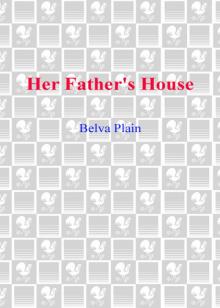 Her Father's House
Her Father's House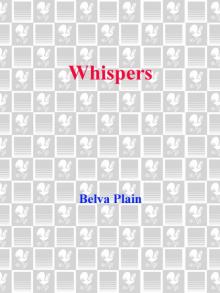 Whispers
Whispers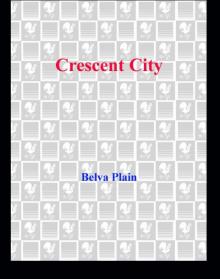 Crescent City
Crescent City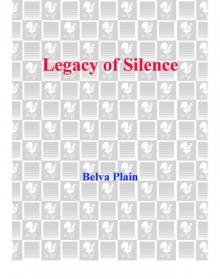 Legacy of Silence
Legacy of Silence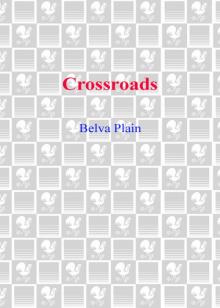 Crossroads
Crossroads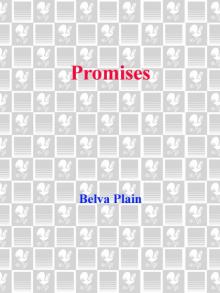 Promises
Promises After the Fire
After the Fire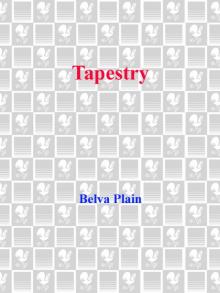 Tapestry
Tapestry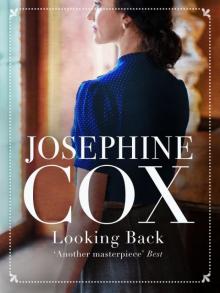 Looking Back
Looking Back Heartwood
Heartwood The Carousel
The Carousel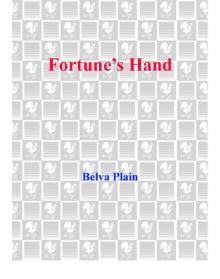 Fortune's Hand
Fortune's Hand Homecoming
Homecoming Random Winds
Random Winds Harvest
Harvest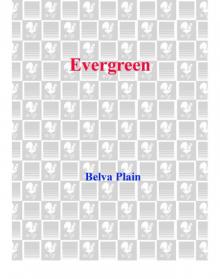 Evergreen
Evergreen Treasures
Treasures The Sight of the Stars
The Sight of the Stars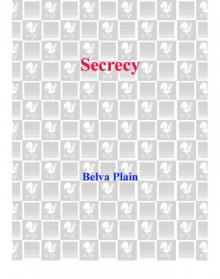 Secrecy
Secrecy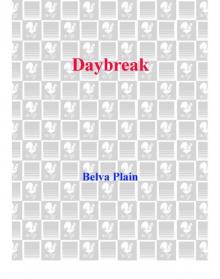 Daybreak
Daybreak Eden Burning
Eden Burning